Nerine Dorman's Blog, page 37
September 18, 2017
Guide to Sieges of South Africa by Nicki von der Heyde
I've been interested in the forces that shaped South Africa's history for a long while now, particularly the Anglo-Boer war, so when I had the opportunity to read Guide to Sieges of South Africa (Struik Travel & Heritage, Penguin Random House South Africa 2017) by Nicki von der Heyde, I grabbed the book with both hands.
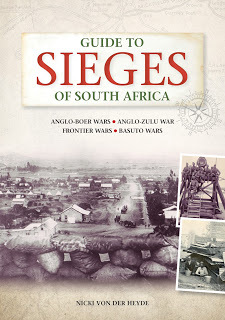 By no means an exhaustive account, Guide to Sieges of South Africa nevertheless gives a good introduction to some of the conflict that occurred in South Africa, including the frontier wars between the British and the Xhosa, the Zulu, and of course the two Anglo-Boer wars. Nicki's style is engaging and conversational, and brings each siege to life. In addition to a run-down of the individual conflicts, she also sketches an overview of the events that took place that led up to the siege. Each section not only has a wealth of photographic images supporting it, but also information boxes with facts and anecdotes, maps and information for those wishing to use the book as a travel guide. So there's a lot going on here, and it's well put together for such a slim volume.
By no means an exhaustive account, Guide to Sieges of South Africa nevertheless gives a good introduction to some of the conflict that occurred in South Africa, including the frontier wars between the British and the Xhosa, the Zulu, and of course the two Anglo-Boer wars. Nicki's style is engaging and conversational, and brings each siege to life. In addition to a run-down of the individual conflicts, she also sketches an overview of the events that took place that led up to the siege. Each section not only has a wealth of photographic images supporting it, but also information boxes with facts and anecdotes, maps and information for those wishing to use the book as a travel guide. So there's a lot going on here, and it's well put together for such a slim volume.
If anything (and as someone who didn't get the opportunity to study history while at school) I came away with a far better appreciation of my country's tumultuous past and the disastrous effects that European colonisation had on the indigenous people. War is an ugly thing, for sure, but I do believe it's important that we have an understanding of the past so that we don't repeat the same mistakes.
That being said, I found the smaller details, of the day-to-day endurance of defenders and attackers fascinating, how people overcame challenges despite all the horrors around them. All too often I've driven past some of these locations without an understanding of the history attached and the conflict that occurred, and Nicki has done an excellent job bringing this all to life. This is a lovely book that is very much useful to include in a reference library or to enrich your next road trip.
 By no means an exhaustive account, Guide to Sieges of South Africa nevertheless gives a good introduction to some of the conflict that occurred in South Africa, including the frontier wars between the British and the Xhosa, the Zulu, and of course the two Anglo-Boer wars. Nicki's style is engaging and conversational, and brings each siege to life. In addition to a run-down of the individual conflicts, she also sketches an overview of the events that took place that led up to the siege. Each section not only has a wealth of photographic images supporting it, but also information boxes with facts and anecdotes, maps and information for those wishing to use the book as a travel guide. So there's a lot going on here, and it's well put together for such a slim volume.
By no means an exhaustive account, Guide to Sieges of South Africa nevertheless gives a good introduction to some of the conflict that occurred in South Africa, including the frontier wars between the British and the Xhosa, the Zulu, and of course the two Anglo-Boer wars. Nicki's style is engaging and conversational, and brings each siege to life. In addition to a run-down of the individual conflicts, she also sketches an overview of the events that took place that led up to the siege. Each section not only has a wealth of photographic images supporting it, but also information boxes with facts and anecdotes, maps and information for those wishing to use the book as a travel guide. So there's a lot going on here, and it's well put together for such a slim volume.If anything (and as someone who didn't get the opportunity to study history while at school) I came away with a far better appreciation of my country's tumultuous past and the disastrous effects that European colonisation had on the indigenous people. War is an ugly thing, for sure, but I do believe it's important that we have an understanding of the past so that we don't repeat the same mistakes.
That being said, I found the smaller details, of the day-to-day endurance of defenders and attackers fascinating, how people overcame challenges despite all the horrors around them. All too often I've driven past some of these locations without an understanding of the history attached and the conflict that occurred, and Nicki has done an excellent job bringing this all to life. This is a lovely book that is very much useful to include in a reference library or to enrich your next road trip.
Published on September 18, 2017 10:56
September 15, 2017
Prince of Fools by Mark Lawrence
I'm a horrible, horrible person because I've taken *months* to finish Prince of Fools (The Red Queen's War #1) by Mark Lawrence (Goodreads tells me I started during December last year and it's quite inexcusable, really, that I've tarried so long). But that's what Mark's writing is to me – something to savour. The Red Queen's War is the next trilogy to get into if you've discovered and loved The Broken Empire trilogy.
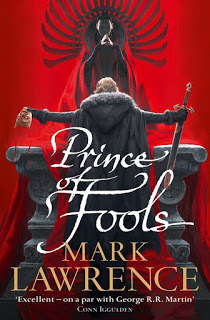 But let's talk about Jorg Ancrath first, our bad-boy, maverick prince from The Broken Empire. Here we were faced with a delightfully psychopathic adventurer who had absolutely no regard for his own personal safety or long-term survival. Jorg would heedlessly fling himself from one untenable situation to the next, offering astute commentary along the way that signals a lively mind and a somewhat absurd sense of humour.
But let's talk about Jorg Ancrath first, our bad-boy, maverick prince from The Broken Empire. Here we were faced with a delightfully psychopathic adventurer who had absolutely no regard for his own personal safety or long-term survival. Jorg would heedlessly fling himself from one untenable situation to the next, offering astute commentary along the way that signals a lively mind and a somewhat absurd sense of humour.
The howling of readers by the time book three drew to a close, that Mark was *finished* with Jorg... Well, it was adorable. [She says with a smile, gives Mark a high five for stopping when the going is good.]
Sensibly, Mark went on to create an entirely different tone in The Red Queen's War with our new friend Jalan Kendeth, 10th in line to the Red Queen's throne and unashamedly a lying, gambling womaniser, whose healthy sense of cowardice has kept him alive all this time. While Jalan is no Jorg, he's certainly still a smart-mouthed chap, so his explanation of events as they unfurl is half the fun.
Jalan is a reluctant hero. Haring off to the frozen north to face a great evil is the last thing on his mind, but there are larger forces at play in this cracked world where magic is bleeding back in to cause untold chaos. Jalan, and his equally reluctant counterpart Snorri ver Snagason, find themselves bound together as pawns in a game where they don't have all the rules. True to Mark's writing, there is plenty of bloodshed, death, violence, wenching and all the things that soft-hearted, gentle readers may want to avoid.
Evidently I'm not a soft-hearted, gentle reader, so I quite happily followed our two lads from one misadventure to the next. Knowing what I do about Mark's writing, and how he puts his stories together, I'm suitably entertained and looking forward to the other two instalments in the trilogy.
I must add here that I particularly adore Snorri. Part of me feels as if *he* is the actual hero of the story; Jalan is merely the storyteller spinning a saga about a mythic warrior and father on a quest to save his family. On the outside, Snorri appears to be *just* a hulking brute, but slowly the layers are peeled back and you discover a character of great complexity and subtle intelligence. I like it when that happens.
In essence, Prince of Fools is a dudebro quest, so it's probably not going to appeal to those wanting a story that passes the Bechdel test. That being said, there were some cameo appearances that amused me greatly (you'll understand why when you read the book – it does take place during the same time that Jorg has his adventures). And seriously, this was just a huge load of fun to read, gore and all, especially with Jalan's witty observations along the way and some of the unexpected twists that had me shaking my head.
 But let's talk about Jorg Ancrath first, our bad-boy, maverick prince from The Broken Empire. Here we were faced with a delightfully psychopathic adventurer who had absolutely no regard for his own personal safety or long-term survival. Jorg would heedlessly fling himself from one untenable situation to the next, offering astute commentary along the way that signals a lively mind and a somewhat absurd sense of humour.
But let's talk about Jorg Ancrath first, our bad-boy, maverick prince from The Broken Empire. Here we were faced with a delightfully psychopathic adventurer who had absolutely no regard for his own personal safety or long-term survival. Jorg would heedlessly fling himself from one untenable situation to the next, offering astute commentary along the way that signals a lively mind and a somewhat absurd sense of humour.The howling of readers by the time book three drew to a close, that Mark was *finished* with Jorg... Well, it was adorable. [She says with a smile, gives Mark a high five for stopping when the going is good.]
Sensibly, Mark went on to create an entirely different tone in The Red Queen's War with our new friend Jalan Kendeth, 10th in line to the Red Queen's throne and unashamedly a lying, gambling womaniser, whose healthy sense of cowardice has kept him alive all this time. While Jalan is no Jorg, he's certainly still a smart-mouthed chap, so his explanation of events as they unfurl is half the fun.
Jalan is a reluctant hero. Haring off to the frozen north to face a great evil is the last thing on his mind, but there are larger forces at play in this cracked world where magic is bleeding back in to cause untold chaos. Jalan, and his equally reluctant counterpart Snorri ver Snagason, find themselves bound together as pawns in a game where they don't have all the rules. True to Mark's writing, there is plenty of bloodshed, death, violence, wenching and all the things that soft-hearted, gentle readers may want to avoid.
Evidently I'm not a soft-hearted, gentle reader, so I quite happily followed our two lads from one misadventure to the next. Knowing what I do about Mark's writing, and how he puts his stories together, I'm suitably entertained and looking forward to the other two instalments in the trilogy.
I must add here that I particularly adore Snorri. Part of me feels as if *he* is the actual hero of the story; Jalan is merely the storyteller spinning a saga about a mythic warrior and father on a quest to save his family. On the outside, Snorri appears to be *just* a hulking brute, but slowly the layers are peeled back and you discover a character of great complexity and subtle intelligence. I like it when that happens.
In essence, Prince of Fools is a dudebro quest, so it's probably not going to appeal to those wanting a story that passes the Bechdel test. That being said, there were some cameo appearances that amused me greatly (you'll understand why when you read the book – it does take place during the same time that Jorg has his adventures). And seriously, this was just a huge load of fun to read, gore and all, especially with Jalan's witty observations along the way and some of the unexpected twists that had me shaking my head.
Published on September 15, 2017 04:34
September 13, 2017
Brigadier and the Spirit Pony by Marga Jonker
Okay, sometimes the books I receive to review end up being a bit of a lucky dip in that I get titles I wouldn't ordinarily read, and Brigadier and the Spirit Pony, by Marga Jonker is most certainly one of those titles. That being said, in the spirit of fairness, I will offer a review as free as possible from my usual biases.
Firstly, I'm not a horse-mad preteen – the age group Jonker's book is most likely aimed at. It's quite clear from the get-go that Jonker knows a lot about the correct care of horses, down to the minute details, (as much as I know about horses, having grown up around a horse-besotted family member). So if you've got a young girl (or boy) in your family of around 10 to 12, who's nuts about horses, then this may well be the book they're going to read in one sitting.
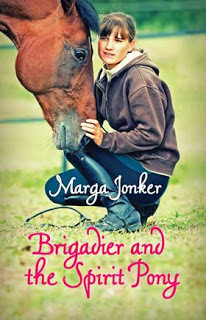 We meet Gabi and Alex, sisters who are dealing with the fact that their estranged father Ben has just come sailing back into their lives. He couldn't be more different from their mom (who has custody), and after years of not seeing them regularly, Ben's understandably awkward – though to give him credit, he tries really hard.
We meet Gabi and Alex, sisters who are dealing with the fact that their estranged father Ben has just come sailing back into their lives. He couldn't be more different from their mom (who has custody), and after years of not seeing them regularly, Ben's understandably awkward – though to give him credit, he tries really hard.
In fact, to give daddy kudos, he's willing to schlep a horsebox containing Gabi's prized horse Brigadier along with them when they go for a stay in a holiday house on an estate situated in the Harkerville forest. But what Ben doesn't at first admit is that his new girlfriend Val will be there too. Awkward. Alex is a bit of a brat, but she does have some redeeming qualities (and reminds me awfully of what I was like at her age).
I'm not going to give exhaustive plot details for fear of spoiling, but we do have some adventure time involving an outride in the forest. We meet a kooky landlady who believes she communes with the forest spirits, and the crazy ex-wife overreacts to The Thing that happens. There's a whiff of a love interest and suggestion of supernatural elements... and there is the solving of a mystery. Not all quite on Nancy Drew level, but still mildly entertaining. Not enough spirit pony, if you ask me.
Granted, I did feel near the end that there was too much chaos with the addition of a prayer group (it felt a bit contrived), so the ending was a bit more complicated than it should have been with the addition of those extra characters and actions, thereby robbing the story of some of its impact, and my feelings are also that mother dearest overreacted a bit too much (there was a scene involving a camera which seemed an odd plot twist – I mean why care so much about what's on Ben's camera when there are bigger issues at stake?) So yeah, those were the two things I didn't buy so much.
I feel if some of this near the ending could have been streamlined, and maybe if the author had dug a little deeper with the development of the Big Adventure We Won't Go Into Depth About, the tension could have been a bit more twisty and stronger, which is what I felt this story needed.
Overall, this is a light, horsey read, and I'd quite happily pass this on to the age group I've mentioned. Gabi's a great character in that she is so level-headed when in a stressful situation, and I think she's a great lead character – a resourceful young woman who pretty much handle herself when she's in trouble.
Firstly, I'm not a horse-mad preteen – the age group Jonker's book is most likely aimed at. It's quite clear from the get-go that Jonker knows a lot about the correct care of horses, down to the minute details, (as much as I know about horses, having grown up around a horse-besotted family member). So if you've got a young girl (or boy) in your family of around 10 to 12, who's nuts about horses, then this may well be the book they're going to read in one sitting.
 We meet Gabi and Alex, sisters who are dealing with the fact that their estranged father Ben has just come sailing back into their lives. He couldn't be more different from their mom (who has custody), and after years of not seeing them regularly, Ben's understandably awkward – though to give him credit, he tries really hard.
We meet Gabi and Alex, sisters who are dealing with the fact that their estranged father Ben has just come sailing back into their lives. He couldn't be more different from their mom (who has custody), and after years of not seeing them regularly, Ben's understandably awkward – though to give him credit, he tries really hard.In fact, to give daddy kudos, he's willing to schlep a horsebox containing Gabi's prized horse Brigadier along with them when they go for a stay in a holiday house on an estate situated in the Harkerville forest. But what Ben doesn't at first admit is that his new girlfriend Val will be there too. Awkward. Alex is a bit of a brat, but she does have some redeeming qualities (and reminds me awfully of what I was like at her age).
I'm not going to give exhaustive plot details for fear of spoiling, but we do have some adventure time involving an outride in the forest. We meet a kooky landlady who believes she communes with the forest spirits, and the crazy ex-wife overreacts to The Thing that happens. There's a whiff of a love interest and suggestion of supernatural elements... and there is the solving of a mystery. Not all quite on Nancy Drew level, but still mildly entertaining. Not enough spirit pony, if you ask me.
Granted, I did feel near the end that there was too much chaos with the addition of a prayer group (it felt a bit contrived), so the ending was a bit more complicated than it should have been with the addition of those extra characters and actions, thereby robbing the story of some of its impact, and my feelings are also that mother dearest overreacted a bit too much (there was a scene involving a camera which seemed an odd plot twist – I mean why care so much about what's on Ben's camera when there are bigger issues at stake?) So yeah, those were the two things I didn't buy so much.
I feel if some of this near the ending could have been streamlined, and maybe if the author had dug a little deeper with the development of the Big Adventure We Won't Go Into Depth About, the tension could have been a bit more twisty and stronger, which is what I felt this story needed.
Overall, this is a light, horsey read, and I'd quite happily pass this on to the age group I've mentioned. Gabi's a great character in that she is so level-headed when in a stressful situation, and I think she's a great lead character – a resourceful young woman who pretty much handle herself when she's in trouble.
Published on September 13, 2017 13:15
September 5, 2017
Fanfiction round-up for August (better late than never)
I suppose I shouldn’t brag that I’m getting to beta read bits of the *next* Schattenriss novel before it drops, and let me tell you, it’s absolutely fabulous. But enough teasing. And yes, for those of you who’re absolutely devastated that my
Scions of the Inquisition
is now complete, never fear. I am busy writing my next epic, which will be a crossover with Labyrinth involving everyone’s favourite necromancer when he comes up against Jareth the Goblin King. (To be honest, I’ve had quite a few people beg me to write this, so I’m glad I finally have the opportunity.)
Some folks have asked whether I’ll be writing a sequel for Scions, and the answer is a “not for the present”. Sometimes it’s best to end a story at a “happy for now” and leave it up to readers’ imagination lest I invoke the curse of Too Much Awesome that seems to bedevil series. Besides, there are thousands of stories out there still to be told, and I will only have the time for a fraction of them before I shuffle off this mortal coil.
This month, however, I’m going to point you in the direction of another of the Schattenriss misadventures for Kai, Dorian and co. when a pub crawl in Orlais goes horribly south Scenes From an Inquisition – A Night on the Town. I won’t spoil, but will add that I’m desperate to try my hand at drawing Ira. I guess you’ll have to wait and see who or what Ira is. But, be warned, this story does hint at a little Lovecraftian horror, so expect … Stuff. The party banter alone makes this well worth the read.
Another author I’ve added to my subscription list is ThirdPretender. While I’m busy with one of their longer works (which I’ll go on about once it's done, I’m going to point you in the direction of their story The Consequences of Crying Wolf . It’s a wangsty Solavellan piece, but what makes it so fabulous is that it’s the result of a story prompt (you’ll see the prompt at the bottom). I promise you the piece will kick you in all the feelz. Real quality writing too.
That's all for now. If some of you have a Dragon Age fic you'd like to recommend for me to review on my blog, let me know. Put "Dragon Age Fic" in the subject line and motivate me in the body of the email. I like narrative-driven stories, so perhaps lay off the fluff, but if there is an overriding reason why you think I should read a story that may not be my usual fare, I'm willing to listen. Also, if you're an artist who'd like to be featured, I'm always happy to share the link to your chosen website if your art works for me. Let me know.
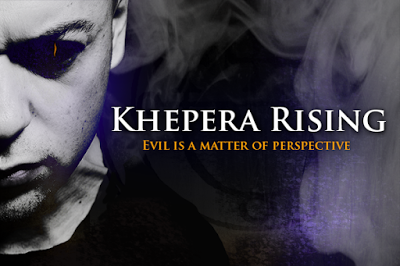
Some folks have asked whether I’ll be writing a sequel for Scions, and the answer is a “not for the present”. Sometimes it’s best to end a story at a “happy for now” and leave it up to readers’ imagination lest I invoke the curse of Too Much Awesome that seems to bedevil series. Besides, there are thousands of stories out there still to be told, and I will only have the time for a fraction of them before I shuffle off this mortal coil.
This month, however, I’m going to point you in the direction of another of the Schattenriss misadventures for Kai, Dorian and co. when a pub crawl in Orlais goes horribly south Scenes From an Inquisition – A Night on the Town. I won’t spoil, but will add that I’m desperate to try my hand at drawing Ira. I guess you’ll have to wait and see who or what Ira is. But, be warned, this story does hint at a little Lovecraftian horror, so expect … Stuff. The party banter alone makes this well worth the read.
Another author I’ve added to my subscription list is ThirdPretender. While I’m busy with one of their longer works (which I’ll go on about once it's done, I’m going to point you in the direction of their story The Consequences of Crying Wolf . It’s a wangsty Solavellan piece, but what makes it so fabulous is that it’s the result of a story prompt (you’ll see the prompt at the bottom). I promise you the piece will kick you in all the feelz. Real quality writing too.
That's all for now. If some of you have a Dragon Age fic you'd like to recommend for me to review on my blog, let me know. Put "Dragon Age Fic" in the subject line and motivate me in the body of the email. I like narrative-driven stories, so perhaps lay off the fluff, but if there is an overriding reason why you think I should read a story that may not be my usual fare, I'm willing to listen. Also, if you're an artist who'd like to be featured, I'm always happy to share the link to your chosen website if your art works for me. Let me know.

Published on September 05, 2017 11:39
September 1, 2017
RiftHealer by AC Smyth
Okay, so I'm done with the Changers of Chandris trilogy by AC Smyth, and my feelings remain mixed. What I loved about this was the setting, which was so radically different from the usual euro-centric fantasy fare. We have an island ravaged by the effects of colonisation. We have people whose cultures are being slowly eroded. We have intrigue. We have disasters related to a magical volcano that offers powers to certain people who can link to their spirit kye and shift into bird forms. Some of these "changers" also have further talents. All this blends quite nicely into a complex world with some interesting developments all round.
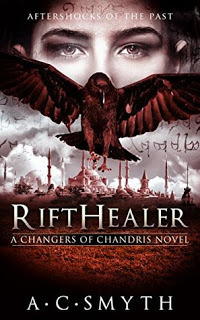 But.
But.
But.
While books 1 and 2 maintained a decent pace, I felt as if Rifthealer (book 3) was essentially just an extended epilogue. Even though there was conflict related to the primary antagonist in the previous two books, it didn't have the same tension. In fact, I felt the dealing with the antagonist in the previous two books felt too easily resolved.
I *did* enjoy reading because I was invested in the characters themselves, but I felt as if the stakes weren't quite high enough. We have quite a few threads happening, and a large cast of characters, but I felt as if there should have been a bit more punch to the ending. Not that it was bad, and I must add that the resolutions were satisfying because I wanted to see where the characters ended up.
The Changers of Chandris is an accessible fantasy trilogy with an m/m theme (which is refreshing in itself). It has a lot going for it overall, however misses the mark just ever so slightly with its (figuratively) moustache-twirling antagonists who revel in revealing their evil plots and the slacking off of the narrative tension by book three. All that considered, I still enjoyed it, and the story does have a lot going for it, even if some of the plot arcs could have been better executed.
 But.
But.But.
While books 1 and 2 maintained a decent pace, I felt as if Rifthealer (book 3) was essentially just an extended epilogue. Even though there was conflict related to the primary antagonist in the previous two books, it didn't have the same tension. In fact, I felt the dealing with the antagonist in the previous two books felt too easily resolved.
I *did* enjoy reading because I was invested in the characters themselves, but I felt as if the stakes weren't quite high enough. We have quite a few threads happening, and a large cast of characters, but I felt as if there should have been a bit more punch to the ending. Not that it was bad, and I must add that the resolutions were satisfying because I wanted to see where the characters ended up.
The Changers of Chandris is an accessible fantasy trilogy with an m/m theme (which is refreshing in itself). It has a lot going for it overall, however misses the mark just ever so slightly with its (figuratively) moustache-twirling antagonists who revel in revealing their evil plots and the slacking off of the narrative tension by book three. All that considered, I still enjoyed it, and the story does have a lot going for it, even if some of the plot arcs could have been better executed.
Published on September 01, 2017 15:25
August 23, 2017
Toby Bennett, Bloody Parchment 2014 Finalist
I think Toby Bennett has probably been one of the most regular Bloody Parchment finalists; in fact I think there have only been two issues where he *didn't* appear. His writing is a particular brand of ... dare I say it ... whimsical, playful horror. But he writes pretty darn awesome range of fiction too (go check out his Amazon page).
His story in Bloody Parchment: Blue Honey and the Valley of Shadow is a retelling of an old favourite fairy tale ... but not quite how you'd imagine it. But here we have a short Q&A with the man. Come on in... Draw up a chair and sit closer to the fire.
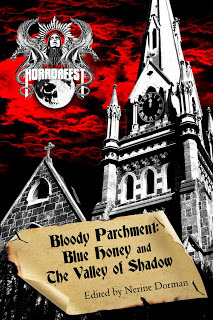 What darkness lies at the heart of your story?
What darkness lies at the heart of your story?
The loss of innocence.
When I first thought of the idea I was remembering those fairy tales they told about frog princes and it occurred to me to wonder what would happen if the princess turned into something slimy…
What do you love the most about writing?
Love? You mean I have a choice?! The fact is I have a relentless need to express myself and tell stories. There is no sensation that I find as worthwhile as when a story comes together just so and I realise I’ve said exactly what I wanted to at the outset… of course that doesn’t happen every time and as with any meaningful relationship … it can get complicated.
Why does reading matter?
I think what really matters is stories – the stories we know and tell ourselves define us and how we see the world around us.
If I had a budget of millions and a thousand elephants I might be making movies right now, but writing has one huge advantage and that is that it is probably the most immediate way for an individual to share their story…
Oh and there’s also an immense amount of satisfaction to be had from slinging words… that is a dragon that every writer has to chase.
What other things have you written?
My most recent release is Umbra , the story of a young boy’s struggle to reunite a shadow with her body in a city where shadows are treated as a commodity.
I have also written Viral with Benjamin Knox
I have several older novels available on Amazon Kindle including:
Heaven’s Gate, The Silent Song and The Endless Ocean
… the list goes on…
As far as horror and short fiction goes I had my Co-written story DreamShock in the Lovecraft eZine, and I was very happy to have “Sacrament of Tears” published in African Monsters. I regularly release a collection of holiday themed horror stories in the annual Creepy Christmas collection.
I’m also finishing up work on the audiobook of my novel Cave Canem.
I keep threatening to revamp my website – check that out for more.
His story in Bloody Parchment: Blue Honey and the Valley of Shadow is a retelling of an old favourite fairy tale ... but not quite how you'd imagine it. But here we have a short Q&A with the man. Come on in... Draw up a chair and sit closer to the fire.
 What darkness lies at the heart of your story?
What darkness lies at the heart of your story?
The loss of innocence.
When I first thought of the idea I was remembering those fairy tales they told about frog princes and it occurred to me to wonder what would happen if the princess turned into something slimy…
What do you love the most about writing?
Love? You mean I have a choice?! The fact is I have a relentless need to express myself and tell stories. There is no sensation that I find as worthwhile as when a story comes together just so and I realise I’ve said exactly what I wanted to at the outset… of course that doesn’t happen every time and as with any meaningful relationship … it can get complicated.
Why does reading matter?
I think what really matters is stories – the stories we know and tell ourselves define us and how we see the world around us.
If I had a budget of millions and a thousand elephants I might be making movies right now, but writing has one huge advantage and that is that it is probably the most immediate way for an individual to share their story…
Oh and there’s also an immense amount of satisfaction to be had from slinging words… that is a dragon that every writer has to chase.
An excerpt:
“How long had I waited in this place?
A dragonfly lumbered past me, his abdomen heavy and swollen. I shifted my gaze to follow the iridescent insect. A strange fascination began to grow in me. My fingers twitched, would I be fast enough to catch it?
“Here.” The voice startled me and I looked down. The frog held the ball out to me with a hand only slightly smaller than my own. I took it gingerly. Green slime oozed away and the metal beneath glistened in the grey light of the garden.
“Kisss?” It raised itself out of the water. Waiting.
I wanted to be sick just looking at it, but I had given my word.
I lowered myself to its level until I was looking directly into those bulging eyes. I set down the ball and it tipped slightly, forcing it down in the mud to stop it rolling.
I crawled closer.
The thick mud squelched up between my fingers and clung to my knees. I had neglected to keep my dress from falling into it, so the fabric was soon filthy and drenched.
What other things have you written?
My most recent release is Umbra , the story of a young boy’s struggle to reunite a shadow with her body in a city where shadows are treated as a commodity.
I have also written Viral with Benjamin Knox
I have several older novels available on Amazon Kindle including:
Heaven’s Gate, The Silent Song and The Endless Ocean
… the list goes on…
As far as horror and short fiction goes I had my Co-written story DreamShock in the Lovecraft eZine, and I was very happy to have “Sacrament of Tears” published in African Monsters. I regularly release a collection of holiday themed horror stories in the annual Creepy Christmas collection.
I’m also finishing up work on the audiobook of my novel Cave Canem.
I keep threatening to revamp my website – check that out for more.
Published on August 23, 2017 13:21
Nebula Wards Showcase 2016
I didn't even think twice when I saw the Nebula Wards Showcase 2016 anthology, edited by Mercedes Lackey, on the shelf at my local bookshop – I bought it. And then I was pleased to see some familiar names – Eugie Foster, Aliette de Bodard, and Alyssa Wong. While I'm not going to go over every story or excerpt collected here, I will touch on the works that jumped out at me and why they resonated.
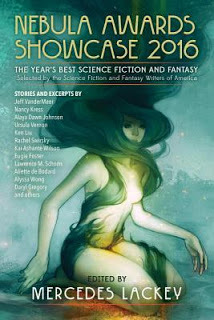 Aliette de Bodard's "The Breath of War" spoke to me as we meet Rechan, upon whose world expectant women need the support of their stoneman or -woman in order to give birth. This is a haunting tale infused with aspects of both fantasy and SF, and the mechanics of the sculpting of the sentient stone in this story reminds me a little of Robin Hobb's memory stone in the Farseer books. De Bodard examines the connections of family but also a deeper yearning of those who are never sure where their place is in existence, and being torn between the known and unknown.
Aliette de Bodard's "The Breath of War" spoke to me as we meet Rechan, upon whose world expectant women need the support of their stoneman or -woman in order to give birth. This is a haunting tale infused with aspects of both fantasy and SF, and the mechanics of the sculpting of the sentient stone in this story reminds me a little of Robin Hobb's memory stone in the Farseer books. De Bodard examines the connections of family but also a deeper yearning of those who are never sure where their place is in existence, and being torn between the known and unknown.
Eugie Foster's "When it Ends, He Catches Her" is equally haunting, framed within a last dance between two lovers, and how memory endures, encapsulated within movement. The setting is desolate, and there is little hope here, but there is an intrinsic beauty that I've always associated with Foster's writing.
Alyssa Wong's "The Fisher Queen" is one of those scratchy-behind-the-eyes stories that stayed with me throughout as she takes the idea of mermaids and subverts it. What if an entire industry was based on *eating* mermaids? And what if they were put to *other* uses before brought to land. This is an uncomfortable read, and perhaps for that, I love it the best.
"Jackalope Wives" by Ursula Vernon was just lovely, spun out with the lilting cadences of an American folk tale as we are plunged into a world where some folks are touched by a wilder magic, and what they make of it is entirely up to them. With the resultant unintended consequences.
Nancy Kress was the Nebula Award Winner for "Best Novella" and reading "Yesterday's Kin" in its entirety was a real treat. She examines the bonds of family within this tale of Marianne, a scientist, who believes that her paper on evolutionary genetics is nothing special – until first contact results in the aliens showing interest in her work. We segue also to her son Noah, and how different his experience with the aliens is. I won't give spoilers, but as far as first contact stories usually go, this one hit me with all the feels in the right places.
Overall, I'm seeing more of a tendency towards SF or magical realism in the stories selected. Not so much anything secondary world fantasy, which is a pity. But then I think this is a global trend at present. That being said, I still enjoyed this collection immensely, and would recommend it to anyone who wants to dip into the works that are currently considered to be the top of the SFF genre.
 Aliette de Bodard's "The Breath of War" spoke to me as we meet Rechan, upon whose world expectant women need the support of their stoneman or -woman in order to give birth. This is a haunting tale infused with aspects of both fantasy and SF, and the mechanics of the sculpting of the sentient stone in this story reminds me a little of Robin Hobb's memory stone in the Farseer books. De Bodard examines the connections of family but also a deeper yearning of those who are never sure where their place is in existence, and being torn between the known and unknown.
Aliette de Bodard's "The Breath of War" spoke to me as we meet Rechan, upon whose world expectant women need the support of their stoneman or -woman in order to give birth. This is a haunting tale infused with aspects of both fantasy and SF, and the mechanics of the sculpting of the sentient stone in this story reminds me a little of Robin Hobb's memory stone in the Farseer books. De Bodard examines the connections of family but also a deeper yearning of those who are never sure where their place is in existence, and being torn between the known and unknown.Eugie Foster's "When it Ends, He Catches Her" is equally haunting, framed within a last dance between two lovers, and how memory endures, encapsulated within movement. The setting is desolate, and there is little hope here, but there is an intrinsic beauty that I've always associated with Foster's writing.
Alyssa Wong's "The Fisher Queen" is one of those scratchy-behind-the-eyes stories that stayed with me throughout as she takes the idea of mermaids and subverts it. What if an entire industry was based on *eating* mermaids? And what if they were put to *other* uses before brought to land. This is an uncomfortable read, and perhaps for that, I love it the best.
"Jackalope Wives" by Ursula Vernon was just lovely, spun out with the lilting cadences of an American folk tale as we are plunged into a world where some folks are touched by a wilder magic, and what they make of it is entirely up to them. With the resultant unintended consequences.
Nancy Kress was the Nebula Award Winner for "Best Novella" and reading "Yesterday's Kin" in its entirety was a real treat. She examines the bonds of family within this tale of Marianne, a scientist, who believes that her paper on evolutionary genetics is nothing special – until first contact results in the aliens showing interest in her work. We segue also to her son Noah, and how different his experience with the aliens is. I won't give spoilers, but as far as first contact stories usually go, this one hit me with all the feels in the right places.
Overall, I'm seeing more of a tendency towards SF or magical realism in the stories selected. Not so much anything secondary world fantasy, which is a pity. But then I think this is a global trend at present. That being said, I still enjoyed this collection immensely, and would recommend it to anyone who wants to dip into the works that are currently considered to be the top of the SFF genre.
Published on August 23, 2017 04:57
August 22, 2017
Into the leafy greenwood...
Thinking back now, I'm not quite sure how or when I first heard about
Platbos forest
, but when I took the time to read up about it, I knew it was one of those places I was dying to see. Even better, it's situated within driving distance of home – on the road between Stanford and Gansbaai. As much as I'd have loved to have gone to stay over in the location's accommodation, this was a feasible day trip for us as well.
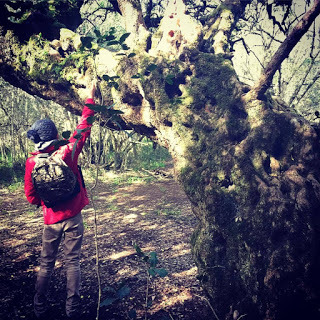 Special note: Taking a drive through the Overberg during mid- to late-August is always a treat because the flowering canola fields are *spectacular*. This day's colour palette was a combination of shocking canary yellow splashes against vivid green and aquamarine sky filled with wispy clouds. Take the back roads between Caledon and Napier, and you'll miss the worst of the traffic (don't be tempted to take a short cut through Hermanus – it's going to take longer for all the twists and turns).
Special note: Taking a drive through the Overberg during mid- to late-August is always a treat because the flowering canola fields are *spectacular*. This day's colour palette was a combination of shocking canary yellow splashes against vivid green and aquamarine sky filled with wispy clouds. Take the back roads between Caledon and Napier, and you'll miss the worst of the traffic (don't be tempted to take a short cut through Hermanus – it's going to take longer for all the twists and turns).
So, what makes this forest special? Well, apart from it being a secret world tucked away in the heart of the fynbos biome, it is its own unique ecosystem. Though none of the trees are comparable to some of the giants you'd find further east at Knysna, some of them are positively *ancient* like the milkwood at the heart of Platbos that is said to be more than 1000 years old. Yep. that's pretty darn old.
Platbos is a bird-lover's paradise. I have a feeling if we'd come specifically to get some twitching done, we'd have seen a lot more, but I did spot southern boubou, sombre greenbul and Cape batis. Granted, I see these chaps nearly daily at my own home, but it's nice to point them out elsewhere.
The moment you step out of the car and tread upon the forest path, you are immersed in another world. Bird calls. But also a kind of watchful silence as your soles press down into a thick carpet of leaf litter. Low-hanging boughs are furred in moss and lichen, and twisted lianas festoon branches. Ferns flourish in nooks and hollows, and if you look carefully, you may find mushrooms. Occasionally there are picnic tables that invite you to sit down and enjoy refreshments, but there's also a scaffold that will allow you a view over the canopy. A secret labyrinth made from old alikreukel shells also beckons you to follow the twisting path.
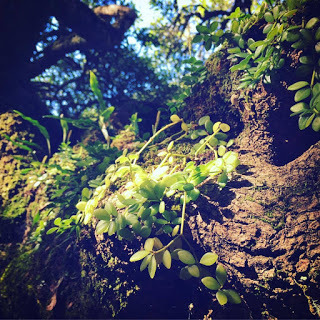 This is the kind of lost world that beckons you to stay. If you hadn't been told that Platbos exists, you might drive past it every day without even knowing it's there, for it is not a large forest, nor are the trees tall. Because it is cupped between the rolling hills of the Overberg, it is easy to mistake it for merely brushwood that you pass on your way elsewhere. That is, until you take a closer look.
This is the kind of lost world that beckons you to stay. If you hadn't been told that Platbos exists, you might drive past it every day without even knowing it's there, for it is not a large forest, nor are the trees tall. Because it is cupped between the rolling hills of the Overberg, it is easy to mistake it for merely brushwood that you pass on your way elsewhere. That is, until you take a closer look.
Apart from this being a lovely excursion for day visitors who're exploring the region, Platbos also offers a range of rustic accommodation. And by rustic, I mean, don't expect to be plugged into any of your devices. Pack them away. Perhaps bring art supplies, board games, physical books to read. Go for walks in the forest, relax in your private area. You have no idea how tempting this is for me – so I will be back – and this time I'll stay overnight.
So yeah, I've mentioned the birds, but there are other critters here too, ranging from baboons and bushbuck, all the way to genets and caracals (red lynx) ... and even the rather retiring Cape leopard. I am beyond excited about the latter, knowing that these big cats still roam the Overberg despite it being so agriculturally developed. Which reminds me I have seen one of these kitties many years ago, crossing the big road between Napier and Bredasdorp, but that is another story for another time.
NB: The cost per adult is R50, per child R20 – look out for the honesty box at the information cabin.
 Special note: Taking a drive through the Overberg during mid- to late-August is always a treat because the flowering canola fields are *spectacular*. This day's colour palette was a combination of shocking canary yellow splashes against vivid green and aquamarine sky filled with wispy clouds. Take the back roads between Caledon and Napier, and you'll miss the worst of the traffic (don't be tempted to take a short cut through Hermanus – it's going to take longer for all the twists and turns).
Special note: Taking a drive through the Overberg during mid- to late-August is always a treat because the flowering canola fields are *spectacular*. This day's colour palette was a combination of shocking canary yellow splashes against vivid green and aquamarine sky filled with wispy clouds. Take the back roads between Caledon and Napier, and you'll miss the worst of the traffic (don't be tempted to take a short cut through Hermanus – it's going to take longer for all the twists and turns).So, what makes this forest special? Well, apart from it being a secret world tucked away in the heart of the fynbos biome, it is its own unique ecosystem. Though none of the trees are comparable to some of the giants you'd find further east at Knysna, some of them are positively *ancient* like the milkwood at the heart of Platbos that is said to be more than 1000 years old. Yep. that's pretty darn old.
Platbos is a bird-lover's paradise. I have a feeling if we'd come specifically to get some twitching done, we'd have seen a lot more, but I did spot southern boubou, sombre greenbul and Cape batis. Granted, I see these chaps nearly daily at my own home, but it's nice to point them out elsewhere.
The moment you step out of the car and tread upon the forest path, you are immersed in another world. Bird calls. But also a kind of watchful silence as your soles press down into a thick carpet of leaf litter. Low-hanging boughs are furred in moss and lichen, and twisted lianas festoon branches. Ferns flourish in nooks and hollows, and if you look carefully, you may find mushrooms. Occasionally there are picnic tables that invite you to sit down and enjoy refreshments, but there's also a scaffold that will allow you a view over the canopy. A secret labyrinth made from old alikreukel shells also beckons you to follow the twisting path.
 This is the kind of lost world that beckons you to stay. If you hadn't been told that Platbos exists, you might drive past it every day without even knowing it's there, for it is not a large forest, nor are the trees tall. Because it is cupped between the rolling hills of the Overberg, it is easy to mistake it for merely brushwood that you pass on your way elsewhere. That is, until you take a closer look.
This is the kind of lost world that beckons you to stay. If you hadn't been told that Platbos exists, you might drive past it every day without even knowing it's there, for it is not a large forest, nor are the trees tall. Because it is cupped between the rolling hills of the Overberg, it is easy to mistake it for merely brushwood that you pass on your way elsewhere. That is, until you take a closer look.Apart from this being a lovely excursion for day visitors who're exploring the region, Platbos also offers a range of rustic accommodation. And by rustic, I mean, don't expect to be plugged into any of your devices. Pack them away. Perhaps bring art supplies, board games, physical books to read. Go for walks in the forest, relax in your private area. You have no idea how tempting this is for me – so I will be back – and this time I'll stay overnight.
So yeah, I've mentioned the birds, but there are other critters here too, ranging from baboons and bushbuck, all the way to genets and caracals (red lynx) ... and even the rather retiring Cape leopard. I am beyond excited about the latter, knowing that these big cats still roam the Overberg despite it being so agriculturally developed. Which reminds me I have seen one of these kitties many years ago, crossing the big road between Napier and Bredasdorp, but that is another story for another time.
NB: The cost per adult is R50, per child R20 – look out for the honesty box at the information cabin.
Published on August 22, 2017 06:16
August 13, 2017
Into the Labyrinth...
I've watched
Labyrinth
, the Jim Henson film starring David Bowie as the immortal Jareth the Goblin King, exactly three times, and each time I've gotten something a little different from it. And yes, it's one of *those* films that are on my list of "movies that stuck with me".
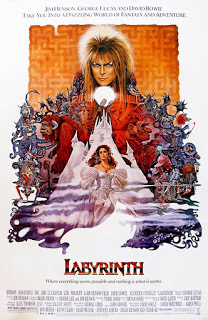 Pictures: IMDBI first watched the film when it released here in South Africa on the big screen, which would have been about six months to a year after its foreign release (thank you, apartheid-era government for the sanctions that meant we were perpetually behind everything happening elsewhere in the world). It would have been around 1987 (Labyrinth having released in 1986 in the US and elsewhere). Which meant I was nine or thereabouts, that deliciously awkward age when you're not a little kiddo anymore but you're not quite a preteen yet, and you're only just figuring out that you don't quite fit in anywhere.
Pictures: IMDBI first watched the film when it released here in South Africa on the big screen, which would have been about six months to a year after its foreign release (thank you, apartheid-era government for the sanctions that meant we were perpetually behind everything happening elsewhere in the world). It would have been around 1987 (Labyrinth having released in 1986 in the US and elsewhere). Which meant I was nine or thereabouts, that deliciously awkward age when you're not a little kiddo anymore but you're not quite a preteen yet, and you're only just figuring out that you don't quite fit in anywhere.
I identified with Sarah (Jennifer Connelly), and Jareth scared the ever-loving crap out of me. For various reasons—that I'll go into. At the time, the SFX and puppetry was the top of its game for the film industry. Directors had to work around the limitations of technology, which in my mind led to some brilliant solutions (despite crappy blue screens). And there was an artistry to the film, and attention to detail with the sets that you rarely see with fantasy films these day (okay, maybe LotR et al). But there would be no convincing fire-breathing dragons, if you get my drift... A lot is suggested, left up to the imagination, or requires you to suspend disbelief when looking at a puppet and *not* thinking about the person behind (or inside) it making it come alive. Sets look like they've been set up on stage, and somehow the lack of realism didn't bother me as much back then as it kinda does now. (Horribly spoilt by CGI, I know.) Yet the artistry is undeniable, even if there is glitter EVERYWHERE.
Fast forward ten years... And I watched the film again, this time at the height of my gothness, with my then gothboy. And Labyrinth just fell flat. Okay, the what-the-fuckery of the musical interludes had dated horribly, and truth be told, the film would have been much stronger if some scenes had simply been cut (like those red, head-tossing, badly blue-screened puppets in the swamp). And I mean those tight pants. That left nothing to the imagination. And the bits that jiggled. Just as mesmerising and cringe-worthy as the first time I watched the film. What. The. Fuck. David Bowie.
When I was 19, I lost the ability to love the film. For me back then it was a steaming pile of what-the-fuckery. Also, I admit freely that I took myself waaay too seriously. After all, I had an image to uphold and MY GOD the 80s hairstyles, music... Too much.
I watched the film now, at the not-so-tender age of 39. Okay, I see what just happened. But I smiled, I laughed, and indulged.
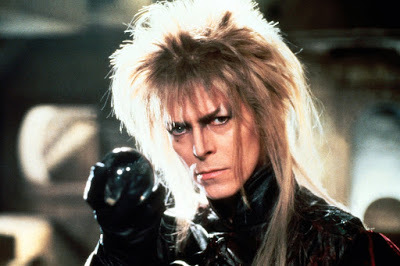
Labyrinth has been on my mind a lot. A while back I read this article, which kinda stuck with me. Why is it that despite its glorious what-the-fuckery, this film has remained one that I can say with all honesty is part of my childhood? A film that I will often mention as being important, along with dreadful yet fabulous creations like Highlander, The Crow, Ladyhawke, and The Neverending Story, that I will reminisce about often. What does this film say about me and my particular world view? Is it that the context of the film is also important?
I admit that I'm busy writing a fic that's a crossover with another fandom I love, so I have particular reasons for revisiting Labyrinth. I even bought the 30-year anniversary novelisation of the film. (It's an okay read so far – not brilliant but fair.) I really feel like I need to wrap my head around the core themes and lore, because they're important (to me) on a meta level, if I'm going to cut to the quick of all my pondering.
The first thing that struck me with the rewatch was the awkward nature of the May/December relationship between 15-year-old Sarah and the ageless yet not-quite-young Jareth, who gives me the impression of ancient power that's stagnant, decaying even compared to the flush of Sarah's youth and her possible limitless potential. The sexual tension between the two is implied, never realised (this is kinda a children's film after all). Even at age nine I was aware of this dynamic between the two, especially the taboo nature of the possibility of the thing that is implied. That in itself was frightening. And somehow something to be anticipated too in my own future. This was especially clear later when Sarah finds herself immersed in a masked ball, garbed in a rather bridal white gown and she has her dance with Jareth. Near the end, though she has had help from her friends to reach the castle, she is clear that facing Jareth is something she needs to do on her own.
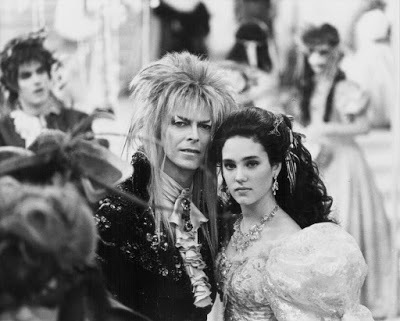
We need to admit that yes, teens are on the cusp of adulthood, so they will be confronting that change from childhood to adulthood. There is something altogether predatory about Jareth, yet at the same time Sarah *does* offer us a realisation of her own incipient feminine power. There is a shift in power happening here.
Yet there's another subtext to the film that, when viewed in the light of current norms, is decidedly *uncomfortable* – let's talk about that peach. My first thought was of the Wicked Queen offering Snow White that poison apple. In a similar fashion, the peach Jareth offers Sarah renders her insensible; she is diverted from her mission to rescue her baby brother Toby (even though it is her fault he was taken in the first place) and is horribly distracted by that decadent masked ball where she has her dance with Jareth. Cinderella much? A peach can symbolise many things, but some of the more common ones in Western mythology would be purity, innocence and yes, virginity. Later, when Sarah examines the peach after she's bitten into it, she finds that its heart is rotten and filled with worms. Yet a peach is also a symbol of the heart, and thereby desire. Jareth distracts Sarah by offering her what she *thinks* she desires. When she breaks from the spell of the masked ball, she's in a rubble heap where the inhabitants try to weigh her down with her past—the items she thinks may be important to her.
The common theme in the labyrinth is that nothing should be taken for granted; nothing is what it seems (think the Cleaners in the tunnels, that are all scary blades from the front but are revealed to be a mechanism powered by goblins from behind, or the fearsome gate guardian at the Goblin City which is just a giant mech powered by a little goblin in a cockpit that is easily overthrown once his identity is uncovered). The beauty Jareth offers hides a rotten core, and partaking of what he gives sickens one, draws you from your path. It's a wee bit like popping roofies into your date's drink too... Though I think this last was *possibly* not Jim Henson's intention, and it makes more sense that he's referencing the Snow White story.
But I'll echo here what was said over on the Smart Bitches, Trashy Books blog when they have a pull quote from the film's dialogue:
Jareth grants desires, and it's typical of faerie lore: Beware of what you ask. There is an interchange of power happening when Jareth takes on the aspects of Sarah's fears and desires, and the dance between the two (yes, I think the image of a masked ball was entirely intentional) is a subtle interplay of their coming together as polar opposites. Jareth is Sarah's animus. That's if we're going to get all Jungian. He exists because of her and for her in order to facilitate her own individuation. Okay. Enough big words.
I often feel that the animus is a useful way to explain our perennial fascination with the bad boy in literature, film and games. The anti-hero, villain, bad-boy protagonist all represent the wilder parts of ourselves that we wish to redeem, to assimilate into ourselves. They exist on the outskirts and are not afraid to push boundaries, to do the things that we fear, and for that we both love and loathe for they challenge our status quo. Fear and fascination often go hand in hand.
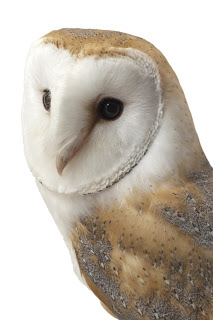 Picture: PixabayOur relationship with fear is important. It keeps us from being too comfortable. Jareth offers Sarah a glimpse into a world where her wildest fantasy—that there is some Goblin King who will shake the foundations of her world and grant her deepest desires exists. And, like many stories where wishes are granted, we don't always think these desires through. We don't always consider the outcomes of our wishes.
Picture: PixabayOur relationship with fear is important. It keeps us from being too comfortable. Jareth offers Sarah a glimpse into a world where her wildest fantasy—that there is some Goblin King who will shake the foundations of her world and grant her deepest desires exists. And, like many stories where wishes are granted, we don't always think these desires through. We don't always consider the outcomes of our wishes.
Toby is a responsibility that is laid on Sarah. She resents her brother, but she clearly loves the little interloper. Which older sibling hasn't felt that a younger brother or sister hasn't diminished the love and resources a parent lavishes on their offspring? She has to face the truth that she needs to become independent, which isn't an easy transition to make.
Another thought...
It's no accident either that Jareth transforms into an owl, a bird often associated with ill omen. Yet sometimes also with with wisdom, of a being that can see at night. It is both harbinger of doom and guardian in the deepest night. And in that, I think it's a perfect choice for our Goblin King. I'm also reminded of Rothbart, the evil sorcerer in the ballet Swan Lake, who transforms into an owl. It's also no surprise that when Sarah eventually comes into her own, Jareth is the one rendered powerless, and returns to his bird form. (You have no power over me.)
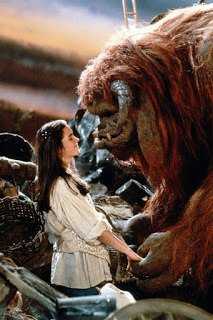 Sarah often cries out about how things are not fair, and as an older viewer, I can look at her situation and understand her confusion. She's not quite a child anymore, yet she is increasingly saddled with grown-up responsibilities, which she resents. Part of her journey through Jareth's labyrinth is accepting that burden (she insists on facing Jareth on her own, and rightly so). She is a lovely protagonist, in that we see her change, grow into herself. This change is perfectly represented by her attitude when she returns after defeating Jareth. Not only does she give Toby the bear Lancelot, a toy that she cherished so much and was the McGuffin that sparked her initial, ill-considered wish to have the Goblin King take that child away from her, but she packs away the artefacts of her past that were holding her back (the pictures of her absent mother, the music box, toys). She is ready to be the young woman she has grown into.
Sarah often cries out about how things are not fair, and as an older viewer, I can look at her situation and understand her confusion. She's not quite a child anymore, yet she is increasingly saddled with grown-up responsibilities, which she resents. Part of her journey through Jareth's labyrinth is accepting that burden (she insists on facing Jareth on her own, and rightly so). She is a lovely protagonist, in that we see her change, grow into herself. This change is perfectly represented by her attitude when she returns after defeating Jareth. Not only does she give Toby the bear Lancelot, a toy that she cherished so much and was the McGuffin that sparked her initial, ill-considered wish to have the Goblin King take that child away from her, but she packs away the artefacts of her past that were holding her back (the pictures of her absent mother, the music box, toys). She is ready to be the young woman she has grown into.
And yet, when she glances at her reflection in the mirror, and sees the friends she has made along the way (Ludo, Hoggle, Sir Didymus). She can see them in the mirror (illusion) but when she turns to look into her bedroom, they are not there. They are saying goodbye (yet another allusion to the end of childhood). In many stories, this would be it, the end of that make-believe, magical world of childhood and the sincerity of the friendships that are formed then. But instead of making the final cut, Sarah does not let go of that sense of wonder. She will grow up, but unlike many adults, she holds onto the magic of her youth. And that, my friends, is a lesson we can all learn.
* * * *
Like my writing? Do consider supporting my fiction by heading over to my Amazon author page and making a purchase. Alternatively, follow me on Twitter and say "hi". Tell me you read this piece and I'll mail you an ecopy of one of my novels.
 Pictures: IMDBI first watched the film when it released here in South Africa on the big screen, which would have been about six months to a year after its foreign release (thank you, apartheid-era government for the sanctions that meant we were perpetually behind everything happening elsewhere in the world). It would have been around 1987 (Labyrinth having released in 1986 in the US and elsewhere). Which meant I was nine or thereabouts, that deliciously awkward age when you're not a little kiddo anymore but you're not quite a preteen yet, and you're only just figuring out that you don't quite fit in anywhere.
Pictures: IMDBI first watched the film when it released here in South Africa on the big screen, which would have been about six months to a year after its foreign release (thank you, apartheid-era government for the sanctions that meant we were perpetually behind everything happening elsewhere in the world). It would have been around 1987 (Labyrinth having released in 1986 in the US and elsewhere). Which meant I was nine or thereabouts, that deliciously awkward age when you're not a little kiddo anymore but you're not quite a preteen yet, and you're only just figuring out that you don't quite fit in anywhere.I identified with Sarah (Jennifer Connelly), and Jareth scared the ever-loving crap out of me. For various reasons—that I'll go into. At the time, the SFX and puppetry was the top of its game for the film industry. Directors had to work around the limitations of technology, which in my mind led to some brilliant solutions (despite crappy blue screens). And there was an artistry to the film, and attention to detail with the sets that you rarely see with fantasy films these day (okay, maybe LotR et al). But there would be no convincing fire-breathing dragons, if you get my drift... A lot is suggested, left up to the imagination, or requires you to suspend disbelief when looking at a puppet and *not* thinking about the person behind (or inside) it making it come alive. Sets look like they've been set up on stage, and somehow the lack of realism didn't bother me as much back then as it kinda does now. (Horribly spoilt by CGI, I know.) Yet the artistry is undeniable, even if there is glitter EVERYWHERE.
Fast forward ten years... And I watched the film again, this time at the height of my gothness, with my then gothboy. And Labyrinth just fell flat. Okay, the what-the-fuckery of the musical interludes had dated horribly, and truth be told, the film would have been much stronger if some scenes had simply been cut (like those red, head-tossing, badly blue-screened puppets in the swamp). And I mean those tight pants. That left nothing to the imagination. And the bits that jiggled. Just as mesmerising and cringe-worthy as the first time I watched the film. What. The. Fuck. David Bowie.
When I was 19, I lost the ability to love the film. For me back then it was a steaming pile of what-the-fuckery. Also, I admit freely that I took myself waaay too seriously. After all, I had an image to uphold and MY GOD the 80s hairstyles, music... Too much.
I watched the film now, at the not-so-tender age of 39. Okay, I see what just happened. But I smiled, I laughed, and indulged.

Labyrinth has been on my mind a lot. A while back I read this article, which kinda stuck with me. Why is it that despite its glorious what-the-fuckery, this film has remained one that I can say with all honesty is part of my childhood? A film that I will often mention as being important, along with dreadful yet fabulous creations like Highlander, The Crow, Ladyhawke, and The Neverending Story, that I will reminisce about often. What does this film say about me and my particular world view? Is it that the context of the film is also important?
I admit that I'm busy writing a fic that's a crossover with another fandom I love, so I have particular reasons for revisiting Labyrinth. I even bought the 30-year anniversary novelisation of the film. (It's an okay read so far – not brilliant but fair.) I really feel like I need to wrap my head around the core themes and lore, because they're important (to me) on a meta level, if I'm going to cut to the quick of all my pondering.
The first thing that struck me with the rewatch was the awkward nature of the May/December relationship between 15-year-old Sarah and the ageless yet not-quite-young Jareth, who gives me the impression of ancient power that's stagnant, decaying even compared to the flush of Sarah's youth and her possible limitless potential. The sexual tension between the two is implied, never realised (this is kinda a children's film after all). Even at age nine I was aware of this dynamic between the two, especially the taboo nature of the possibility of the thing that is implied. That in itself was frightening. And somehow something to be anticipated too in my own future. This was especially clear later when Sarah finds herself immersed in a masked ball, garbed in a rather bridal white gown and she has her dance with Jareth. Near the end, though she has had help from her friends to reach the castle, she is clear that facing Jareth is something she needs to do on her own.

We need to admit that yes, teens are on the cusp of adulthood, so they will be confronting that change from childhood to adulthood. There is something altogether predatory about Jareth, yet at the same time Sarah *does* offer us a realisation of her own incipient feminine power. There is a shift in power happening here.
Yet there's another subtext to the film that, when viewed in the light of current norms, is decidedly *uncomfortable* – let's talk about that peach. My first thought was of the Wicked Queen offering Snow White that poison apple. In a similar fashion, the peach Jareth offers Sarah renders her insensible; she is diverted from her mission to rescue her baby brother Toby (even though it is her fault he was taken in the first place) and is horribly distracted by that decadent masked ball where she has her dance with Jareth. Cinderella much? A peach can symbolise many things, but some of the more common ones in Western mythology would be purity, innocence and yes, virginity. Later, when Sarah examines the peach after she's bitten into it, she finds that its heart is rotten and filled with worms. Yet a peach is also a symbol of the heart, and thereby desire. Jareth distracts Sarah by offering her what she *thinks* she desires. When she breaks from the spell of the masked ball, she's in a rubble heap where the inhabitants try to weigh her down with her past—the items she thinks may be important to her.
The common theme in the labyrinth is that nothing should be taken for granted; nothing is what it seems (think the Cleaners in the tunnels, that are all scary blades from the front but are revealed to be a mechanism powered by goblins from behind, or the fearsome gate guardian at the Goblin City which is just a giant mech powered by a little goblin in a cockpit that is easily overthrown once his identity is uncovered). The beauty Jareth offers hides a rotten core, and partaking of what he gives sickens one, draws you from your path. It's a wee bit like popping roofies into your date's drink too... Though I think this last was *possibly* not Jim Henson's intention, and it makes more sense that he's referencing the Snow White story.
But I'll echo here what was said over on the Smart Bitches, Trashy Books blog when they have a pull quote from the film's dialogue:
"Everything that you wanted I have done. You asked that the child be taken. I took him. You cowered before me, I was frightening. I have reordered time. I have turned the world upside down, and I have done it all for *you*! I am exhausted from living up to your expectations. Isn’t that generous?…I ask for so little. Just fear me. Love me. Do as I ask, and I shall be your slave."
Jareth grants desires, and it's typical of faerie lore: Beware of what you ask. There is an interchange of power happening when Jareth takes on the aspects of Sarah's fears and desires, and the dance between the two (yes, I think the image of a masked ball was entirely intentional) is a subtle interplay of their coming together as polar opposites. Jareth is Sarah's animus. That's if we're going to get all Jungian. He exists because of her and for her in order to facilitate her own individuation. Okay. Enough big words.
I often feel that the animus is a useful way to explain our perennial fascination with the bad boy in literature, film and games. The anti-hero, villain, bad-boy protagonist all represent the wilder parts of ourselves that we wish to redeem, to assimilate into ourselves. They exist on the outskirts and are not afraid to push boundaries, to do the things that we fear, and for that we both love and loathe for they challenge our status quo. Fear and fascination often go hand in hand.
 Picture: PixabayOur relationship with fear is important. It keeps us from being too comfortable. Jareth offers Sarah a glimpse into a world where her wildest fantasy—that there is some Goblin King who will shake the foundations of her world and grant her deepest desires exists. And, like many stories where wishes are granted, we don't always think these desires through. We don't always consider the outcomes of our wishes.
Picture: PixabayOur relationship with fear is important. It keeps us from being too comfortable. Jareth offers Sarah a glimpse into a world where her wildest fantasy—that there is some Goblin King who will shake the foundations of her world and grant her deepest desires exists. And, like many stories where wishes are granted, we don't always think these desires through. We don't always consider the outcomes of our wishes.Toby is a responsibility that is laid on Sarah. She resents her brother, but she clearly loves the little interloper. Which older sibling hasn't felt that a younger brother or sister hasn't diminished the love and resources a parent lavishes on their offspring? She has to face the truth that she needs to become independent, which isn't an easy transition to make.
Another thought...
It's no accident either that Jareth transforms into an owl, a bird often associated with ill omen. Yet sometimes also with with wisdom, of a being that can see at night. It is both harbinger of doom and guardian in the deepest night. And in that, I think it's a perfect choice for our Goblin King. I'm also reminded of Rothbart, the evil sorcerer in the ballet Swan Lake, who transforms into an owl. It's also no surprise that when Sarah eventually comes into her own, Jareth is the one rendered powerless, and returns to his bird form. (You have no power over me.)
 Sarah often cries out about how things are not fair, and as an older viewer, I can look at her situation and understand her confusion. She's not quite a child anymore, yet she is increasingly saddled with grown-up responsibilities, which she resents. Part of her journey through Jareth's labyrinth is accepting that burden (she insists on facing Jareth on her own, and rightly so). She is a lovely protagonist, in that we see her change, grow into herself. This change is perfectly represented by her attitude when she returns after defeating Jareth. Not only does she give Toby the bear Lancelot, a toy that she cherished so much and was the McGuffin that sparked her initial, ill-considered wish to have the Goblin King take that child away from her, but she packs away the artefacts of her past that were holding her back (the pictures of her absent mother, the music box, toys). She is ready to be the young woman she has grown into.
Sarah often cries out about how things are not fair, and as an older viewer, I can look at her situation and understand her confusion. She's not quite a child anymore, yet she is increasingly saddled with grown-up responsibilities, which she resents. Part of her journey through Jareth's labyrinth is accepting that burden (she insists on facing Jareth on her own, and rightly so). She is a lovely protagonist, in that we see her change, grow into herself. This change is perfectly represented by her attitude when she returns after defeating Jareth. Not only does she give Toby the bear Lancelot, a toy that she cherished so much and was the McGuffin that sparked her initial, ill-considered wish to have the Goblin King take that child away from her, but she packs away the artefacts of her past that were holding her back (the pictures of her absent mother, the music box, toys). She is ready to be the young woman she has grown into.And yet, when she glances at her reflection in the mirror, and sees the friends she has made along the way (Ludo, Hoggle, Sir Didymus). She can see them in the mirror (illusion) but when she turns to look into her bedroom, they are not there. They are saying goodbye (yet another allusion to the end of childhood). In many stories, this would be it, the end of that make-believe, magical world of childhood and the sincerity of the friendships that are formed then. But instead of making the final cut, Sarah does not let go of that sense of wonder. She will grow up, but unlike many adults, she holds onto the magic of her youth. And that, my friends, is a lesson we can all learn.
* * * *
Like my writing? Do consider supporting my fiction by heading over to my Amazon author page and making a purchase. Alternatively, follow me on Twitter and say "hi". Tell me you read this piece and I'll mail you an ecopy of one of my novels.
Published on August 13, 2017 13:23
August 3, 2017
Meet Bloody Parchment's Jason Mykl Snyman
Every SA Horrorfest Bloody Parchment anthology has that one story that freaks me out beyond all measure. For the current anthology, South African Jason Mykl Snyman has the (dare I say, dubious?) honour of being That Author. Seriously, his "Mastication (The Wendigo Children)" is not for the faint of heart. I welcome him to my blog today to talk about writing ... and well ... That Story (which you can pick up in the latest Bloody Parchment anthology).

What darkness lies at the heart of your story?
Hunger is the first thing which comes to mind. The kind of deep hunger which drives a person mad, provoking anxiety and desperation. That’s the easy way out. I would say the darkness lies in what one person would do to another, in order to survive, in times of extreme hopelessness.
What do you love the most about writing?
I try to tell stories that nobody else has told before. Failing that, I try to tell old stories in new ways. This is the first real horror story I’ve ever written. There’s nothing supernatural about it. No ghosts or creatures or aliens. It’s about ordinary people thrown into unordinary circumstances. Within the human condition, horror can be found anywhere, even in romance. That’s what I love about telling stories – the opportunity to display something real.
Paracelsus once wrote; ‘Poison is in everything, and no thing is without poison. Only the dosage determines whether it will heal or harm.’
Why does reading matter?
As a writer, reading makes you a better writer. You pick things up whether you like it or not. One day those ideas might come to fruition, in their own ways. To anybody else, reading encourages the imagination, enhances understanding and develops your personality. People who do not read are not at all unintelligent, but if you’re not reading, you need to be doing an extreme amount of living to be interesting.
What other things have you written?
My Blog, The Strange Brontides
My short story "What If We Slept" appears in Short Story Africa's Terra Incognita .
"Small Town Blues – or – Things I Lost While Living" (Winner of the Kalahari Review January 2017 IGBY Prize)
"Sweetheart, What Have We Done?" (Jalada Afrika Language Edition) -
"Where The Rivers Go" (New Contrast Issue #172)
"Friday Night" (The Kalahari Review)
This year's SA Horrorfest Bloody Parchment short story competition is currently open. Read more here.
* * *


What darkness lies at the heart of your story?
Hunger is the first thing which comes to mind. The kind of deep hunger which drives a person mad, provoking anxiety and desperation. That’s the easy way out. I would say the darkness lies in what one person would do to another, in order to survive, in times of extreme hopelessness.
What do you love the most about writing?
I try to tell stories that nobody else has told before. Failing that, I try to tell old stories in new ways. This is the first real horror story I’ve ever written. There’s nothing supernatural about it. No ghosts or creatures or aliens. It’s about ordinary people thrown into unordinary circumstances. Within the human condition, horror can be found anywhere, even in romance. That’s what I love about telling stories – the opportunity to display something real.
Paracelsus once wrote; ‘Poison is in everything, and no thing is without poison. Only the dosage determines whether it will heal or harm.’
Why does reading matter?
As a writer, reading makes you a better writer. You pick things up whether you like it or not. One day those ideas might come to fruition, in their own ways. To anybody else, reading encourages the imagination, enhances understanding and develops your personality. People who do not read are not at all unintelligent, but if you’re not reading, you need to be doing an extreme amount of living to be interesting.
An excerpt from "Mastication (The Wendigo Children)"People aren’t very meaty, compared to cows or pigs or deer. The average human body can provide around twenty kilograms of fatty meat and other edible parts such as intestines, liver, heart or guilt-riddled brains. You could eat the skin too, but when Granny died it tasted like mothballs and leather.
They starved in the land of sunsets, each day of glorious light falling too quickly, and all they had was the darkness and the nights spent shaking in each others’ arms, waiting for naked dusk to regain the snow-bound slopes. Their bellies were the thankless monsters of their very own horror story, never recalling past kindness, always wanting more the next day, and the day after that, and the day after that.
What other things have you written?
My Blog, The Strange Brontides
My short story "What If We Slept" appears in Short Story Africa's Terra Incognita .
"Small Town Blues – or – Things I Lost While Living" (Winner of the Kalahari Review January 2017 IGBY Prize)
"Sweetheart, What Have We Done?" (Jalada Afrika Language Edition) -
"Where The Rivers Go" (New Contrast Issue #172)
"Friday Night" (The Kalahari Review)
This year's SA Horrorfest Bloody Parchment short story competition is currently open. Read more here.
* * *

Published on August 03, 2017 13:09



